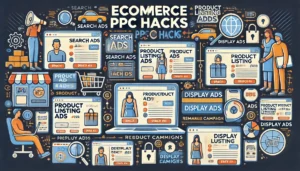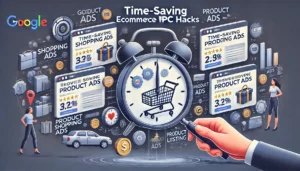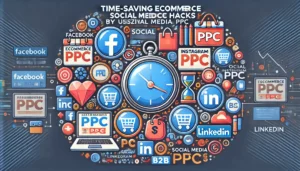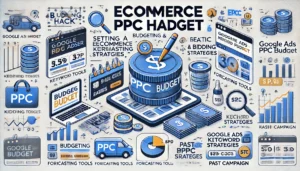Automate Your Success: Time-Saving Ecommerce PPC Hacks for Busy UK Businesses

In today’s fast-paced world, UK businesses need every advantage they can get. Pay-per-click (PPC) advertising is a powerful tool for ecommerce companies looking to boost their online presence and sales. This article will explore essential eCommerce PPC hacks that can save you time and help you succeed in the competitive ecommerce landscape.
Key Takeaways
- Understanding the basics of PPC can help you avoid common mistakes and maximise your ad spend.
- Optimising your Google Ads with the right keywords and compelling ad copy can significantly improve your campaign’s performance.
- Leveraging Google Shopping Ads can showcase your products more effectively and increase your sales.
- Remarketing is a powerful strategy to re-engage visitors who have previously shown interest in your products.
- Partnering with a PPC agency can provide expert guidance and save you valuable time.
Understanding the Basics of Ecommerce PPC Hacks
What is Ecommerce PPC?
Ecommerce PPC, or Pay-Per-Click, is a type of online advertising where businesses pay a fee each time their ad is clicked. It’s a way to buy visits to your site, rather than attempting to earn those visits organically. PPC ads can appear on search engines, social media platforms, and other websites. There are several types of PPC ads commonly used in ecommerce, including:
- Search Ads: These appear at the top of search engine results for relevant keywords, targeting users actively searching for specific products.
- Product Listing Ads (PLAs): Also known as shopping ads, these display product images, prices, and descriptions directly in the search results, attracting buyers with visual appeal.
- Display Ads: Often used in remarketing campaigns, these ads target users who have already visited a site but not purchased, displaying ads on various websites and social media platforms to capture their attention and drive them back to the site.
Why PPC is Crucial for Ecommerce Success (Time-Saving Ecommerce PPC Hacks)
PPC is essential for ecommerce success because it drives targeted traffic to your website. When done correctly, it can lead to higher conversion rates and increased sales. PPC allows us to reach potential customers who are actively searching for products like ours, making it a highly effective marketing strategy. Additionally, PPC provides measurable results, so we can track the performance of our campaigns and make data-driven decisions to improve them.
By leveraging PPC, we can ensure that our ads are seen by the right people at the right time, maximising our chances of converting visitors into customers.
Common PPC Mistakes to Avoid
While PPC can be highly effective, there are common mistakes that can hinder its success. Here are some pitfalls to watch out for:
- Ignoring Negative Keywords: Failing to use negative keywords can result in your ads being shown to the wrong audience, wasting your budget.
- Poor Ad Copy: Compelling ad copy is crucial for attracting clicks. Make sure your ads are clear, concise, and highlight the benefits of your products.
- Not Tracking Conversions: Without tracking conversions, it’s impossible to know which ads are driving sales. Use conversion tracking to measure the effectiveness of your campaigns.
- Overlooking Mobile Users: Many users shop on their mobile devices. Ensure your ads and landing pages are mobile-friendly to capture this audience.
- Setting and Forgetting: PPC campaigns require continuous monitoring and optimisation. Regularly review and adjust your campaigns to improve performance.
By avoiding these common mistakes, we can make the most of our PPC efforts and drive better results for our ecommerce business.
Time-Saving Ecommerce PPC Hacks: Optimising Your Google Ads for Maximum Impact
Setting Up Your Google Ads Account
First things first, setting up your Google Ads account correctly is crucial. We need to ensure that all settings align with our business goals. This includes setting up conversion tracking, linking Google Analytics, and configuring billing information. Proper setup can save us a lot of headaches down the road.
Choosing the Right Keywords (Time-Saving Ecommerce PPC Hacks)
Selecting the right keywords is the backbone of any successful Google Ads campaign. We should focus on a mix of broad, phrase, and exact match keywords. Broad match keywords can help us reach a wider audience, while exact match keywords ensure we target specific search terms. Don’t forget to use negative keywords to philtre out irrelevant traffic.
Creating Compelling Ad Copy
Creating compelling ad copy is an art. Our ads should be clear, concise, and include a strong call-to-action. Highlighting unique selling points and using emotional triggers can make our ads stand out. Remember, the goal is to attract clicks and drive conversions.
A well-optimised Google Ads campaign can significantly boost our online presence and sales. Let’s make sure we get it right from the start.
Time-Saving Ecommerce PPC Hacks: Leveraging Google Shopping Ads
Benefits of Google Shopping Ads
Google Shopping Ads are a powerful tool for ecommerce businesses. They allow us to showcase our products directly in the search results, complete with images, prices, and product details. This visual format captures the shopper’s intent and drives visitors directly to the product listing page, increasing the likelihood of a conversion. By targeting the shopper’s intent, we can capture interest immediately.
Setting Up Google Shopping Campaigns (Time-Saving Ecommerce PPC Hacks)
Setting up a Google Shopping campaign involves several steps. First, we need to create a Google Merchant Centre account and upload our product feed. This feed should include all relevant product information, such as titles, descriptions, prices, and images. Next, we link our Merchant Centre account to our Google Ads account. Finally, we create a Shopping campaign in Google Ads, selecting the products we want to advertise and setting our budget and bids.
Optimising Product Listings
Optimising product listings is crucial for the success of our Google Shopping campaigns. We should ensure that our product titles and descriptions are clear and include relevant keywords. High-quality images are also essential, as they can significantly impact click-through rates. Additionally, we should regularly review and update our product feed to ensure that all information is accurate and up-to-date.
Remember, the evolving landscape of ecommerce in 2024 will require us to continuously optimise our product feeds and utilise interest-based marketing to enhance online visibility and sales.
Time-Saving Ecommerce PPC Hacks: Harnessing the Power of Remarketing
What is Remarketing?
Remarketing, also known as retargeting, is a strategy to re-engage visitors who have previously interacted with your website. By showing targeted ads to these users, we can remind them of our products or services, encouraging them to return and complete a purchase. This approach is highly effective because it targets individuals who have already shown interest in our offerings.
Benefits of Remarketing (Time-Saving Ecommerce PPC Hacks)
Remarketing offers several advantages for ecommerce businesses:
- Increased Conversion Rates: By targeting users who are already familiar with our brand, we can significantly boost conversion rates.
- Cost-Effective: Remarketing campaigns often have a lower cost per acquisition compared to other advertising methods.
- Enhanced Brand Recall: Regularly displaying our ads helps keep our brand top-of-mind for potential customers.
Converting lost leads into new sales is a smart move. If someone has already shown interest by visiting our site, half the work is done.
Setting Up Remarketing Campaigns
To set up a remarketing campaign, follow these steps:
- Install a Remarketing Tag: Add a small piece of code to our website to track visitors.
- Create Custom Audiences: Segment visitors based on their behaviour, such as pages visited or actions taken.
- Design Targeted Ads: Develop ads that specifically address the interests and needs of each audience segment.
- Launch and Monitor: Start the campaign and continuously monitor its performance, making adjustments as needed.
By leveraging remarketing, we can turn curiosity into customers and maximise our advertising efforts.
Time-Saving Ecommerce PPC Hacks: Utilising Social Media PPC
Best Social Media Platforms for PPC
When it comes to social media PPC, choosing the right platform is crucial. Each platform has its own strengths and audience demographics. For instance, Facebook is excellent for reaching a broad audience, while Instagram is perfect for visually appealing products. LinkedIn, on the other hand, is ideal for B2B marketing. Selecting the right platform can make or break your campaign.
Creating Effective Social Media Ads (Time-Saving Ecommerce PPC Hacks)
Creating effective social media ads involves a mix of compelling visuals and engaging copy. We need to focus on what makes our product unique and why customers should choose us. Using high-quality images and videos can significantly boost engagement. Additionally, a clear call-to-action (CTA) is essential to guide users on what to do next.
Measuring Social Media PPC Success
Measuring the success of our social media PPC campaigns is vital for continuous improvement. Key metrics to track include click-through rates (CTR), conversion rates, and return on ad spend (ROAS). By analysing these metrics, we can adjust our strategies to maximise effectiveness.
Social media PPC offers a unique opportunity to connect with our audience on platforms they use daily. By leveraging the strengths of each platform and continuously refining our approach, we can achieve remarkable results.
Time-Saving Ecommerce PPC Hacks: Advanced PPC Strategies
Using AI and Automation in PPC
In today’s fast-paced world, leveraging AI and automation in ecommerce PPC can be a game-changer. AI tools can help us analyse vast amounts of data quickly, making it easier to identify trends and optimise campaigns. Automation can handle repetitive tasks, freeing up our time to focus on strategy. By using AI, we can make data-driven decisions that improve performance.
A/B Testing Your Ads
A/B testing is crucial for understanding what works best in our campaigns. By testing different versions of an ad, we can see which one performs better. This helps us refine our approach and increase our ROI. For example, we might test different headlines, images, or calls to action to see what resonates most with our audience.
Geo-Targeting and Local PPC
Geo-targeting allows us to focus our ads on specific locations. This is especially useful for businesses that operate in certain areas. By targeting local audiences, we can ensure our ads are relevant and increase the chances of conversion. Local PPC can be a powerful tool for driving foot traffic to physical stores or targeting customers in a specific region.
Remember, the key to successful PPC is continuous improvement. Always be testing, analysing, and optimising your campaigns.
Using AI and Automation in PPC (Time-Saving Ecommerce PPC Hacks)
In today’s fast-paced world, leveraging AI and automation in ecommerce PPC can be a game-changer. AI tools can help us analyse vast amounts of data quickly, making it easier to identify trends and optimise campaigns. Automation can handle repetitive tasks, freeing up our time to focus on strategy. By using AI, we can make data-driven decisions that improve performance.
A/B Testing Your Ads
A/B testing is crucial for understanding what works best in our campaigns. By testing different versions of an ad, we can see which one performs better. This helps us refine our approach and increase our ROI. For example, we might test different headlines, images, or calls to action to see what resonates most with our audience.
Geo-Targeting and Local PPC
Geo-targeting allows us to focus our ads on specific locations. This is especially useful for businesses that operate in certain areas. By targeting local audiences, we can ensure our ads are relevant and increase the chances of conversion. Local PPC can be a powerful tool for driving foot traffic to physical stores or targeting customers in a specific region.
Remember, the key to successful PPC is continuous improvement. Always be testing, analysing, and optimising your campaigns.
Time-Saving Ecommerce PPC Hacks: Budgeting and Bidding Strategies
Setting a Realistic PPC Budget
When it comes to setting a budget for PPC, the first step is to estimate how much you’ll spend to get a prospect to click on your ad. If you’re new to PPC, tools like Google Ads Keyword Planner can provide an estimated CPC range for keywords. Another option is using the forecasting tools built into each PPC network. These tools estimate the number of clicks your ad will get as you adjust your daily or lifetime budget.
For those with experience, past campaign data is invaluable. Use this data to guide budgeting for new campaigns. Allocating ample budget is crucial to meet your goals. Starting small might be tempting, but limiting the budget too much can prevent the campaign from succeeding.
Understanding Bidding Strategies (Time-Saving Ecommerce PPC Hacks)
Bidding strategies can vary dramatically from one network to another. For example, Google Ads experts often recommend using manual CPC to gain more control over how much you bid for each keyword. On the other hand, LinkedIn Ads offers manual bidding for maximum control and cost cap for limiting what you spend on key results.
When we worked on Swimsuits Direct’s paid search and Google Shopping campaign, we saw an 80% increase in return on ad spend (ROAS). This was achieved by implementing continuous bid management to account for seasonal changes that fluctuated product demand.
Maximising ROI with Smart Bidding
Smart bidding strategies can help maximise your return on investment (ROI). Some PPC networks automatically adjust bids for you. For instance, LinkedIn Ads can increase your manual CPC bids by up to 45% to improve results. However, in some cases, manual adjustments are necessary. Google Ads allows advertisers to make manual bid adjustments based on factors like audience segment, device type, ad placement, and ad schedule.
To optimise spending, consider scheduling your ads. Running ads around the clock might not always be the best strategy. For example, if your daily budget is spent before 6 a.m. and the conversion rate is low, it might be better to run ads during specific periods to reach prospects at the optimal time.
Setting a realistic PPC budget and understanding bidding strategies are key to a successful ecommerce PPC campaign. By leveraging past data and making informed adjustments, we can maximise ROI and achieve our advertising goals.
Time-Saving Ecommerce PPC Hacks: Analysing and Improving PPC Performance
Key Metrics to Track
To truly understand how well our PPC campaigns are doing, we need to keep an eye on several key metrics. These include impressions, clicks, click-through rate (CTR), cost per click (CPC), and conversions. Tracking these metrics helps us see what’s working and what needs fixing.
Using Analytics Tools (Time-Saving Ecommerce PPC Hacks)
Analytics tools are essential for digging deeper into our PPC data. Google Analytics, for example, can show us how users interact with our site after clicking on an ad. This insight is crucial for making informed decisions about our campaigns.
Continuous Improvement and Optimisation
We should never set and forget our PPC campaigns. Regularly reviewing and tweaking our ads ensures they stay effective. This might involve adjusting bids, updating ad copy, or refining our target audience. A thorough PPC audit can highlight areas for improvement and help us stay ahead of the competition.
Consistent monitoring and adjustments are key to maintaining a successful PPC strategy.
Time-Saving Ecommerce PPC Hacks: Partnering with a PPC Agency for Ecommerce Success
Benefits of Hiring a PPC Agency
When it comes to managing PPC campaigns, time is often a luxury many businesses can’t afford. This is where a PPC ecommerce agency steps in. They bring expertise, tools, and a dedicated team to handle your campaigns, allowing you to focus on other aspects of your business. By partnering with a PPC ad agency, you can expect:
- Professional account audits
- Effective campaign setup
- Thorough keyword research
- Optimised ad copy and creative
- A/B testing for better results
- Landing page and conversion rate optimisation
What to Look for in a PPC Partner (Time-Saving Ecommerce PPC Hacks)
Choosing the right PPC agency is crucial for your ecommerce success. Here are some key factors to consider:
- Experience and Expertise: Look for agencies with a proven track record in ecommerce PPC.
- Transparency: Ensure they provide clear reporting and communication.
- Customised Strategies: They should offer tailored solutions that fit your business needs.
- Tools and Technology: A good agency will use advanced tools for better campaign management.
- Client Reviews: Check testimonials and case studies to gauge their performance.
Case Studies of Successful Partnerships
Many businesses have seen significant growth by partnering with a London PPC agency. For instance, a local retailer saw a 50% increase in sales within three months of working with a PPC agency. Another ecommerce brand doubled their ROI by leveraging the agency’s expertise in keyword optimisation and ad copy.
Partnering with a PPC agency can transform your ecommerce business, driving more traffic and increasing sales. It’s about finding the right partner who understands your goals and can deliver results.
In conclusion, hiring a PPC agency can be a game-changer for your ecommerce business. They bring the expertise, tools, and strategies needed to optimise your campaigns and maximise your ROI.
Time-Saving Ecommerce PPC Hacks: The Role of Mobile PPC in Ecommerce
Importance of Mobile PPC
In today’s fast-paced world, mobile devices have become an integral part of our daily lives. More people are using their smartphones to shop online than ever before. This shift makes mobile PPC (Pay-Per-Click) advertising crucial for ecommerce success. Ignoring mobile users can mean missing out on a significant portion of potential customers.
Creating Mobile-Friendly Ads (Time-Saving Ecommerce PPC Hacks)
Creating ads that are optimised for mobile devices is essential. Here are some tips to ensure your ads are mobile-friendly:
- Use concise and clear ad copy.
- Optimise images for faster loading times.
- Ensure your landing pages are mobile-responsive.
- Include a strong call-to-action (CTA) that is easy to tap.
Tracking Mobile PPC Performance
Tracking the performance of your mobile PPC campaigns is vital to understand what works and what doesn’t. Use analytics tools to monitor key metrics such as click-through rates (CTR), conversion rates, and cost per click (CPC). This data will help you make informed decisions and continuously improve your campaigns.
Mobile PPC is not just an option; it’s a necessity for ecommerce businesses looking to stay competitive in the market.
By focusing on mobile PPC, we can reach a broader audience and drive more sales. Let’s make sure our ads are mobile-friendly and track their performance to maximise our return on investment.
Time-Saving Ecommerce PPC Hacks: Seasonal PPC Campaigns for Ecommerce
Planning for Seasonal Peaks
When it comes to seasonal PPC campaigns, timing is everything. We need to identify key shopping periods like Christmas, Black Friday, and summer sales. By planning ahead, we can ensure our ads are ready to go live at the right moment. This involves researching past performance data and understanding customer behaviour during these peaks.
Creating Seasonal Ad Campaigns (Time-Saving Ecommerce PPC Hacks)
Creating effective seasonal ad campaigns requires a mix of creativity and strategy. We should use eye-catching visuals and compelling copy that speaks directly to the season. Words like “deal,” “limited-time offer,” and “free delivery” can grab attention quickly. Additionally, using site link extensions to promote other offers can increase click-through rates.
Analysing Seasonal Campaign Performance
After launching our seasonal campaigns, it’s crucial to analyse their performance. We should track key metrics such as click-through rates, conversion rates, and return on investment. Using tools like Google Analytics can help us understand what worked and what didn’t. Continuous improvement is key to making the most out of our seasonal PPC efforts.
Seasonal PPC campaigns are a great way to boost sales during peak shopping periods. By planning ahead and analysing performance, we can maximise our return on investment.
Effective feed optimisation and interest-based marketing are essential for successful seasonal campaigns. By focusing on these areas, we can attract high-converting customers and make the most of our advertising budget.
Seasonal PPC campaigns can make a big difference for your eCommerce business. They help you reach more customers during peak times and boost your sales. Want to see how well your ads are doing? Get a free, human review of your ads performance today. Visit our website to learn more.
Conclusion
In conclusion, mastering PPC for your ecommerce business can seem like a daunting task, but with the right strategies, it becomes manageable and highly rewarding. By implementing the hacks discussed, you can save time and see significant improvements in your ad performance. Remember, the key is to stay consistent, keep testing, and always be ready to adapt to new trends. With these tips, your UK business is well on its way to achieving greater success in the competitive ecommerce landscape. Happy advertising!
Frequently Asked Questions
What is Ecommerce PPC?
Ecommerce PPC stands for Pay-Per-Click advertising specifically for online stores. It involves paying a fee each time someone clicks on your ad. These ads can appear on search engines like Google, or on social media platforms.
Why is PPC important for ecommerce success?
PPC is crucial for ecommerce because it drives targeted traffic to your website. This means people who are already interested in your products are more likely to visit your site and make a purchase.
What are common mistakes to avoid in PPC?
Common mistakes include using the wrong keywords, not setting a proper budget, and neglecting to track performance. It’s also important to avoid creating ads that don’t resonate with your target audience.
How do I choose the right keywords for my ads?
Start by researching what words people use to find products like yours. You can use tools like Google Keyword Planner. Pick keywords that are relevant to your products and have a good search volume.
What is remarketing in PPC?
Remarketing is a strategy where you show ads to people who have already visited your website but didn’t make a purchase. This helps remind them of your products and encourages them to come back and buy.
How can I make my Google Shopping ads more effective?
Ensure your product listings are detailed and accurate. Use high-quality images, write clear descriptions, and set competitive prices. Regularly update your product feed to keep information current.
What should I look for in a PPC agency?
Look for an agency with experience in your industry, good client reviews, and a track record of success. They should offer transparent reporting and be willing to work closely with you to meet your goals.
Why is mobile PPC important for ecommerce?
Many people shop on their mobile devices, so it’s important to create ads that look good and work well on phones and tablets. Mobile PPC helps you reach these customers and improve your chances of making sales.
Author
Search Blog
Free PPC Audit
Subscribe to our Newsletter
The Voices of Our Success: Your Words, Our Pride
Don't just take our word for it. With over 100+ five-star reviews, we let our work-and our satisfied clients-speak for us.
"We have been working with PPC Geeks for around 6 months and have found Mark and the team to be very impressive. Having worked with a few companies in this and similar sectors, I rate PPC Geeks as the strongest I have come across. They have taken time to understand our business, our market and competitors and supported us to devise a strategy to generate business. I value the expertise Mark and his team provide and trust them to make the best recommendations for the long-term."
~ Just Go, Alasdair Anderson




